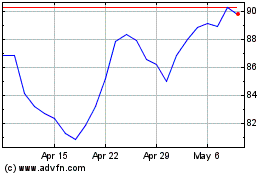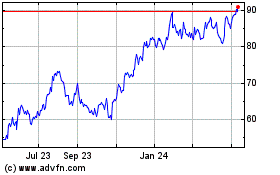Puerto Rico's First BanCorp Ordered To Shape Up
June 08 2010 - 5:03PM
Dow Jones News
First BanCorp Puerto Rico (FBP) was slapped with an enforcement
action from the U.S. Federal Reserve, weeks after three of the
island's banks collapsed.
The San Juan bank, Puerto Rico's second largest by assets and
deposits after Popular Inc. (BPOP), has been struggling with
troubled real estate loans. The Fed barred First BanCorp from
paying a dividend and demanded the bank come up with a plan for
future capital needs within 30 days.
In late April, regulators closed the three weakest Puerto Rican
banks and sold them to stronger competitors, injecting almost $7
billion in capital into the island's banking system in the process.
Puerto Rico's Governor Luis Fortuno and Federal Deposit Insurance
Corp. Chairman Sheila Bair called the sale a milestone for the
nation's troubled banking industry and Puerto Rico's economy. But
as the Federal Reserve's recent action shows, the struggle to heal
Puerto Rico's banking industry remains a work in progress.
The agreement with First BanCorp, disclosed by the bank on
Friday and posted on the Fed's web site Tuesday, comes on the heels
of its consent to demands by the FDIC to draw up a contingency plan
within 45 days "for the sale, merger, or liquidation of" FirstBank,
its banking subsidiary, if fresh capital is not available.
The FDIC wants First Bank to maintain a leverage capital ratio
of at least 8% and a Tier 1 capital ratio of at least 10%; such
measures are indications of a bank's strength. The bank exceeded
all those targets on March 31, according to its earnings
filing.
The bank was ordered to submit reviews about its lending
business and its reserves for loan losses, and its management was
ordered to "restore all aspects of" its banking subsidiary's "safe
and sound condition," and its board to increase "participation in
the affairs."
The island has been in a recession since 2006, and its
government has struggled to reach a fiscal balance and to reshape
an economy once heavily dependent on manufacturing.
In 2005, Puerto Rico's banking industry became a vanguard of the
financial meltdown when many of its banks, including First BanCorp,
were entangled in massive problems related to mortgage
derivatives.
On April 30, Westernbank, R-G Premier Bank, and EuroBank were
closed and sold to island competitors. The FDIC last year slapped
all three with cease and desist orders to improve bad underwriting,
management shortcomings and a growing pile of delinquent real
estate loans.
Those orders struck a considerably harsher tone than First
BanCorp's consent order, particularly about management and board
oversight.
Bank of Nova Scotia (BNS, BNS.T) bought R-G Premier Bank. The
Toronto bank also holds a 10% stake in First BanCorp that it bought
in the aftermath of Puerto Rico's derivative crisis; both parties
said it is a passive investor.
First BanCorp had planned to buy a weaker competitor, but wasn't
able to raise the necessary capital to participate in the FDIC's
auction.
It is still trying to raise $500 million in capital; it is
working to convert into common stock $400 million of preferred
stock owned by the Treasury Department through the Troubled Asset
Relief Program, and exchange non-cumulative preferred shares into
common stock.
First BanCorp reported a $107 million first-quarter loss,
compared to a $22 million profit a year earlier. Losses from loans
the bank cannot collect more than tripled, to $123 million.
Chief Executive Aurelio Aleman told Dow Jones Newswires in an
interview last month that losses from construction loans, the
bank's worst portfolio, are close to the bottom, though he expects
real-estate values to continue to decline.
Aleman expects to grow First BanCorp by luring deposits and
customers from competitors busy digesting their acquisitions.
In a press release Friday, Aleman said the bank is "committed to
continue to work expeditiously to resolve" the issues raised in the
enforcement actions and "strengthen our balance sheet and return
FirstBank to its full earnings potential."
Shares of First BanCorp closed down 5% at $1.14 Tuesday.
-By Matthias Rieker, Dow Jones Newswires; 212-416-2471;
matthias.rieker@dowjones.com
Popular (NASDAQ:BPOP)
Historical Stock Chart
From May 2024 to Jun 2024

Popular (NASDAQ:BPOP)
Historical Stock Chart
From Jun 2023 to Jun 2024
